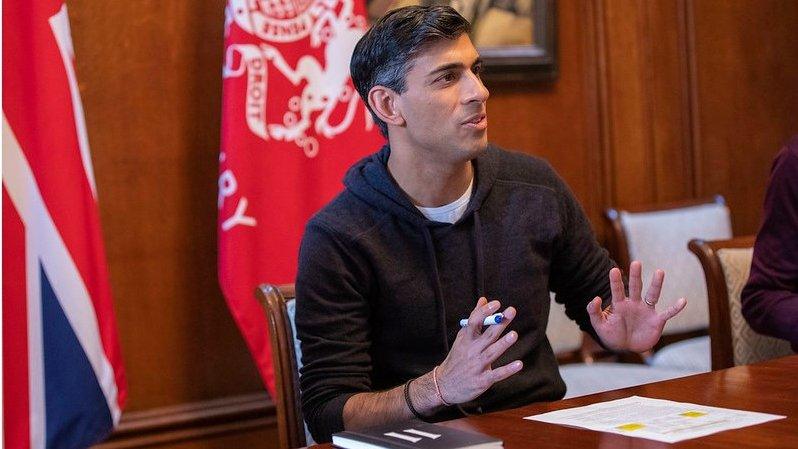Rishi Sunak tries to prove he's a tax-cutter at heart
- Published
- comments

Trust me, I'm a tax cutter.
Rishi Sunak cares so much about tax, the chancellor even had his own ten-page glossy pamphlet that came with the Spring Statement document.
It was tucked under his arm as he emerged from No 11 Downing Street to pose for the cameras before going to the Commons.
There was a practical imperative for him to make some move to help with the cost of living, after demands from all parts of the political spectrum.
And it seems, a self-imposed political imperative to show that despite presiding over enormous rises in tax and borrowing, that he really is a tax cutter at heart.
Two eye-catching cuts were therefore flourished at the dispatch box.
The level at which workers start paying National Insurance gets a chunky increase. From July, it will kick in at the same level of income tax.
In effect, that's a tax cut for millions of workers. But remember, not that long ago, that Rishi Sunak himself had resolved to put that tax up.
So what will be trumpeted as a tax cut by the Tories whenever they get the chance is also a partial reversal of a rise that they themselves decided to do.
No surprise then it's been branded the "hokey cokey" by Labour: not quite in then out - but up, then partly down.

Fuel duty on petrol and diesel will be cut by 5p, in a bid to help motorists with prices at the pumps
Second, the chancellor confirmed what many had long suspected: that he would hold back some financial fire power now, to dangle tax cuts to the voting public in the run-up to the election.
This strategy is not exactly a surprise. But what's deeply unusual is that Mr Sunak chose to announce this giveaway, a penny off income tax, two years before it would kick in.
It's certainly unusual to announce election goodies this far out, not just because it kills any element of political surprise, but also it ties the chancellor's hands in the years ahead.
While the moves seem to designed to polish up Mr Sunak's credentials as a tax cutter, the black and white of the statement documents beg to differ.
One pound in six
As chancellor, he has increased taxes massively more than he has just reduced them.
As the official number crunchers at the OBR put it: "The chancellor has undone just over a quarter of the overall value of the personal tax rises he announced last year, and around a sixth of the overall net tax rises he has announced since becoming chancellor."
In other words, he's giving a pound back for every six that he's already taken.
That's why one right-of-centre think tank, Bright Blue, has branded him the confused chancellor this afternoon.
Another, the free-market Adam Smith Institute, warns the chancellor giveth, and the chancellor taketh away.
With such strong warnings about the drop in living standards that looms, political signalling on tax may be swamped by a much tougher reality.
With the chancellor's chosen big focus on tax, there was less significant attention on immediate help for firms and families who will struggle the most with bills.
There was no mention of increases on benefits, extra cash for public services that might be hit by inflation, and only one mention of the government mantra of "levelling up".
It was always the case that the Treasury favoured a "wait and see" approach when it comes to extra help to people as energy and prices spiral.
Scale of the squeeze
The inflation spike came before the invasion of Ukraine, but accelerates the trend and makes the next few months so much more uncertain.
Just because No 10 didn't press the button on more support today doesn't mean it's not likely in October.
The Conservative benches, and many members of the public too, may be heartened after two years of mammoth public spending to hear the party's money man talk about giving cash back.
Cutting tax at the pump matters. Raising the NI threshold makes a difference.
But at a time of potential peril, Rishi Sunak may have left himself vulnerable to the charge that he hasn't yet understood the scale of the squeeze so many families and firms really face.
He wants to focus on tax cuts, but many voters may very soon be more preoccupied with the unavoidable cut in the standard of how they can afford to live.
Related topics
- Published23 March 2022

- Published23 March 2022

